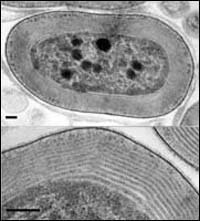The recent tragedy striking the coastlines of the Indian Ocean has highlighted the benefits of international cooperation in Earth Observation for the management of disaster relief, while demonstrating the scope for improved cooperation in the future.
International Charter on Space and Major Disasters
Immediately after the first tsunami struck in the Eastern Indian Ocean the International Charter on Space and Major Disasters was invoked by three different agencies. I

Large and powerful predators such as swordfishes, tunas, and many sharks are unique among fishes in that they possess physiological mechanisms that warm their eyes. A new investigation reported this week sheds important light on the purpose of warming the eyes and the advantage that “warm eyes” confer on ocean predators.
Swordfishes, which hunt in water as cold as 3°C (about 37°F), can maintain their brain and eye temperatures 10°C–15°C (18°F –27°F) above ambient temperatures by u

A new discovery by a team of Queen’s University scientists suggests that ancient earth was much colder than previously thought – a discovery that has broad implications for those studying the earth’s climate.
Queen’s researchers have discovered the mineral ikaite in 700-million-year-old marine sedimentary rocks in the Mackenzie Mountains of the Northwest Territories and eastern Yukon. This discovery proves that the ancient ocean was much colder than previously believed, says Noel Ja
The combined Geophysical Fluid Dynamics Laboratory/University of Rhode Island coupled hurricane-ocean model has helped to improve intensity predictions during tropical storms. However, scientists have found that the model consistently under-predicts maximum wind speed in very strong hurricanes.
In the current issue of the Journal of the Atmospheric Sciences, University of Rhode Island physical oceanographer Dr. Isaac Ginis describes how he and a team of scientists are refining the

Salton Sea find shares ’gene-jumping’ history with its oceanic relatives
Scientists at the University of Oregon have discovered a form of blue-green algae that lives independently in California’s Salton Sea, using near-infrared light for photosynthesis, according to an article published in this week’s online edition of the Proceedings of the National Academy of Sciences (PNAS).
“This new strain of Acaryochloris is unique because it is able to live on its own,” says UO
Scientists using NASA satellite data found the shape of the Earth appears to be influenced by big climate events that cause changes in the mass of water stored in oceans, continents and atmosphere.
The study’s principal researchers are Minkang Cheng and Byron D. Tapley, of the Center for Space Research, University of Texas at Austin. They reviewed climate events like El Niño Southern Oscillation (ENSO) and Pacific Decadal Oscillation (PDO) that affect the amount of water moving in